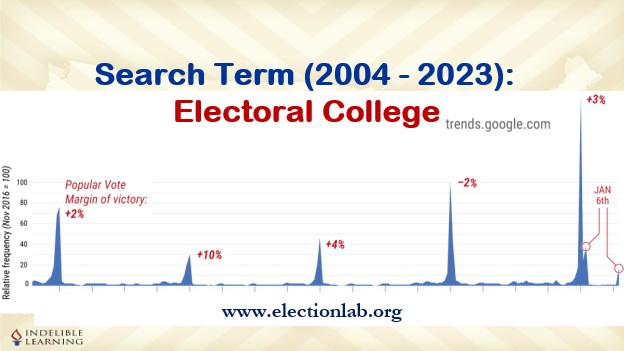
The Electoral College is unique, and one of the most debated aspects of the American political system. While many assume that the President is elected directly by the people, the reality is more complex.
Most Americans struggle to explain the Electoral College. Yet it determines how we choose a President every 4 years. Google searches every election cycle confirm this. There is a huge spike in searches for “electoral college” that peaks …. Can you guess when? It peaks every 4 years, on the Wednesday after the election.
The Electoral College is a mechanism that determines the winner of the presidential election, shaping campaign strategies and sometimes sparking controversy. But how does it actually work?
How the Electoral College Works?
The Electoral College is a system in which electors, rather than individual voters, ultimately decide who becomes President and Vice President of the United States. Here’s how it operates:
Each state is assigned a certain number of electors based on its representation in Congress. This means each state has as many electoral votes as it has U.S. Senators (always 2) plus Representatives in the House. As a result, states with larger populations have more electoral votes than smaller states.
There are 538 total electors across the country. Three more electors come from the District of Columbia. To win the presidency, a candidate must secure a majority, i.e. at least 270 electoral votes.
When citizens cast their vote for president, they are actually voting for a slate of electors pledged to that candidate. These electors then officially cast their votes for president.
Most states use a winner-takes-all system, meaning the candidate who wins the popular vote in that state receives all of its electoral votes. The exceptions are Maine and Nebraska, which use a Congressional District system to allocate their electoral votes.
Electors cast their votes in December, and Congress officially counts them in January to confirm the winner.
Why Was the Electoral College Created?
The Electoral College was established in the U.S. Constitution as a compromise between two competing ideas: allowing Congress to select the President versus relying solely on a direct popular vote. The framers of the Constitution designed this system to balance power between large and small states, ensuring that less-populated states still had a larger say in presidential elections.
The Debate Over the Electoral College
Over the years, the Electoral College has been the subject of ongoing debate. Some argue that it serves an essential function, while others believe it should be replaced with a direct popular vote. Here are some of the main points on both sides:
Arguments in Favor of the Electoral College:
Protects states with smaller populations: without the Electoral College, presidential candidates might focus only on large population centers, ignoring smaller states and rural areas.
Encourages nationwide campaigning: candidates must appeal to a diverse range of states and regions rather than just winning the most populous areas.
Inertia: the system has been in place for over two centuries and has generally functioned without major disruptions.
Arguments Against the Electoral College:
A candidate can win the presidency without winning the popular vote: this has happened multiple times in U.S. history, including in the 2000 and 2016 elections, leading some to question whether the system truly represents the will of the people.
Some votes carry more weight than others: because each state gets at least three electoral votes regardless of population, voters in smaller states have a disproportionately larger influence compared to voters in larger states.
Focus on swing states: presidential campaigns tend to focus on a handful of competitive states, while solidly Democratic or Republican states often receive little attention.
Why the Electoral College Matters
Despite the controversy, the Electoral College remains a fundamental part of the U.S. electoral system. Understanding how it works is essential for every voter, as it influences campaign strategies, election outcomes, and the democratic process itself.
While debates about reforming or abolishing the Electoral College continue, one thing is clear: this system plays a crucial role in shaping American democracy and will likely remain a topic of discussion for years to come.
What do you think? Should the Electoral College remain, or is it time for a change? Let us know your thoughts!
Election Lab: The Best Electoral College Strategy Games For Future Presidents
In addition, if you’d like to learn more about how presidential campaigns use Electoral College to win U.S. Presidential Elections – try our Election Lab Games. Would you like to play a live opponent in the head to head competition? You can. Click on LIVE EVENTS.
Our next event will be on April 16th (Wednesday) at 5 pm PT. You will not need to memorize things. Instead, you will learn more about Electoral College by actually doing it!
We are looking forward to seeing you there.
Dr. Jasminka Vukanovic-Criley MD, FACP, FHM is a multiple award-winning physician, hospitalist, healthcare & education innovator & Associate Clinical Professor of Medicine at UCLA. She is a career mentor & advisor to undergraduate, graduate & postgraduate students & faculty across medicine, science & education. As Founder & CEO of Indelible Learning, Dr. Criley leads a systems-based approach to learning grounded in the belief that we grow geniuses by making complex systems visible, before real-world decisions carry irreversible consequences. Her research focuses on designing evidence-driven digital games & simulations that help people see, question, & improve systems across health, civics, science & human behavior. Dr Criley is a sought-after speaker, a founding Board member of Physician’s Weekly & an advocate for learning experiences that build judgment, agency & healthier institutions. She can be reached on X at @criley_md and at www.linkedin.com/in/jasminka-criley-md